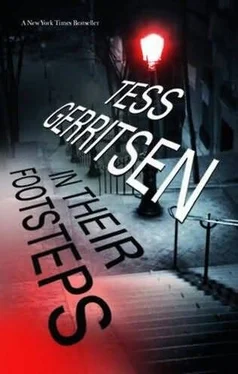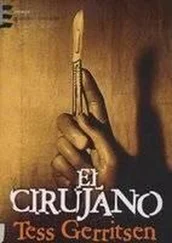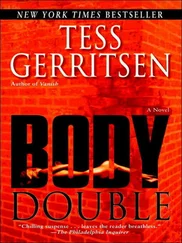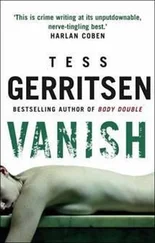Tess Gerritsen - In Their Footsteps
Здесь есть возможность читать онлайн «Tess Gerritsen - In Their Footsteps» — ознакомительный отрывок электронной книги совершенно бесплатно, а после прочтения отрывка купить полную версию. В некоторых случаях можно слушать аудио, скачать через торрент в формате fb2 и присутствует краткое содержание. Жанр: Триллер, на английском языке. Описание произведения, (предисловие) а так же отзывы посетителей доступны на портале библиотеки ЛибКат.
- Название:In Their Footsteps
- Автор:
- Жанр:
- Год:неизвестен
- ISBN:нет данных
- Рейтинг книги:5 / 5. Голосов: 1
-
Избранное:Добавить в избранное
- Отзывы:
-
Ваша оценка:
- 100
- 1
- 2
- 3
- 4
- 5
In Their Footsteps: краткое содержание, описание и аннотация
Предлагаем к чтению аннотацию, описание, краткое содержание или предисловие (зависит от того, что написал сам автор книги «In Their Footsteps»). Если вы не нашли необходимую информацию о книге — напишите в комментариях, мы постараемся отыскать её.
In Their Footsteps — читать онлайн ознакомительный отрывок
Ниже представлен текст книги, разбитый по страницам. Система сохранения места последней прочитанной страницы, позволяет с удобством читать онлайн бесплатно книгу «In Their Footsteps», без необходимости каждый раз заново искать на чём Вы остановились. Поставьте закладку, и сможете в любой момент перейти на страницу, на которой закончили чтение.
Интервал:
Закладка:
“ Marie planted the bomb?”
“No! Marie was the target! She was the only one home when the bomb went off. Everyone assumes it was a mistake, an error in timing. But the bomber knew exactly what he was doing. He was trying to kill Marie, not her husband.” Jordan looked at Reggie with new urgency. “You have to reach Wolf. Tell him what I just said.”
“I don’t know where he is.”
“Ask Daumier.”
“He doesn’t know, either.”
“Then find out where my uncle’s gone off to. If ever I needed a family connection, it’s right now.”
After Reggie had left, the guard escorted Jordan back to his cell. The instant he stepped inside, the familiar smells assaulted him-the odor of sour wine and ripe bodies. Back with old friends, he thought, looking at the two Frenchmen snoring in their cots, the same two men whose cell he’d shared when he was first arrested. A drunk, a thief and him. What a happy little trio they made. He went to his cot and set down the two paper bags with the food and wine. At least he wouldn’t have to gag on any more goulash.
Lying down, he stared at the cobwebs in the corner. So many leads to follow, to run down. A killer’s on the loose and here I am, locked up and useless. Unable to test my theories. If I could just get the help of someone I trust, someone I know beyond a doubt is on my side…
Where the hell is Beryl?
The greek tavern keeper slid two glasses of retsina onto their table. “Summertime, we have many tourists,” he said with a shrug. “I cannot keep track of foreigners.”
“But this man, Rideau, isn’t a tourist,” said Richard. “He’s been living on this island twenty years. A Frenchman.”
The tavern keeper laughed. “Frenchmen, Dutchmen, they are all the same to me,” he grunted and went back into the kitchen.
“Another dead end,” muttered Beryl. She took a sip of retsina and grimaced. “People actually drink this brew?”
“And some of them even enjoy it,” said Richard. “It’s an acquired taste.”
“Then perhaps I’ll acquire it another time.” She pushed the glass away and looked around the gloomy taverna. It was midday, and passengers from the latest cruise ship had started trickling in from the heat, their shopping bags filled with the usual tourist purchases: Grecian urns, fishermen’s caps, peasant dresses. Immersed in the babble of half a dozen languages, it was easy for Beryl to understand why the locals might not bother to distinguish a Frenchman from any other outsider. Foreigners came, they spent money, they left. What more did one need to know about them?
The tavern keeper reemerged from the kitchen carrying a sizzling platter of calamari. He set it on a table occupied by a German family and was about to head back to the kitchen when Richard asked, “Who might know about this Frenchman?”
“You waste your time,” said the tavern keeper. “I tell you, there is no one on this island named Rideau.”
“He brought his family with him,” said Richard. “A wife and a son. The boy would be in his thirties now. His name is Gerard.”
A dish suddenly clattered to the floor behind the counter of the bar. The dark-eyed young woman standing at the tap was frowning at Richard. “Gerard?” she said.
“Gerard Rideau,” said Richard. “Do you know him?”
“She doesn’t know anything,” the tavern keeper insisted, and waved the young woman toward the kitchen.
“But I can see she does,” said Richard.
The woman stood staring at him, as though not certain what to do, what to say.
“We’ve come from Paris,” said Beryl. “It’s very important we speak to Gerard’s father.”
“You are not French,” said the woman.
“No, I’m English.” Beryl nodded toward Richard. “He’s American.”
“He said…he said it was a Frenchman I should be careful of.”
“Who did?”
“Gerard.”
“He’s right to be careful,” said Richard. “But he should know things have gotten even more dangerous. There may be others coming to Paros, looking for his family. He has to talk to us, now .” He pointed to the tavern keeper. “He’ll be your witness. If anything goes wrong.”
The woman hesitated, then went into the kitchen. A moment later, she reemerged. “He does not answer the telephone,” she said. “I will have to drive you there.”
It was a bumpy ride down a lonely stretch of road to Logaras beach. Clouds of dust flew in the open window and coated the jet black hair of their driver. Sofia was her name, and she had been born on the island. Her father managed the hotel near the harbor; now her three brothers ran the business. She could do a better job of it, she thought, but of course no one valued a woman’s opinion, so she worked instead at Theo’s tavern, frying calamari, rolling dolmas. She spoke four languages; one must, she explained, if one wished to live off the tourist trade.
“How do you know Gerard?” asked Beryl.
“We are friends” was the answer.
Lovers, guessed Beryl, seeing the other woman’s cheeks redden.
“His family is French,” said Sofia. “His mother died five years ago, but his father is still alive. But their name is not Rideau. Perhaps-” she looked at them hopefully “-it is a different family you are looking for?”
“They might have changed their name,” said Beryl.
They parked near the beach and strode out across the rocks and sand. “There,” said Sofia, pointing to a distant sailboard skimming the water. “That is Gerard.” She waved and called to him in Greek.
At once the board spun around, the multicolored sail snapping about in a neat jibe. With the wind at his back, Gerard surfed to the beach like a bronzed Adonis and dragged the board onto the sand.
“Gerard,” said Sofia, “these people are looking for a man named Rideau. Is that your father?”
Instantly Gerard dropped his sailboard. “Our name is not Rideau,” he said curtly. Then he turned and walked away.
“Gerard?” called Sofia.
“Let me talk to him,” said Richard, and he followed the other man up the beach.
Beryl stood by Sofia and watched the two men confront each other. Gerard was shaking his head, denying any knowledge of any Rideau family. Through the whistle of the wind, Beryl heard Richard’s voice and the words “bomb” and “murder.” She saw Gerard glance around nervously and knew that he was afraid.
“I hope I have done the right thing,” murmured Sofia. “He is worried.”
“He should be worried.”
“What has his father done?”
“It’s not what he’s done. It’s what he knows.”
At the other end of the beach, Gerard was looking more and more agitated. Abruptly he turned and walked back to Sofia. Richard was right behind him.
“What is it?” asked Sofia.
“We go,” snapped Gerard. “My father’s house.”
This time the drive took them along the coast, past groves of struggling olive trees on their left, and the gray-green Aegean on their right. The smell of Gerard’s suntan lotion permeated the car. Such a dry and barren land, Beryl observed, looking out across the scrub grass. But to a man from a French slum, this would have seemed like a paradise.
“My father,” said Gerard as he drove, “speaks no English. I will have to explain to him what you are asking. He may not remember.”
“I’m sure he does remember,” said Richard. “It’s the reason you left Paris.”
“That was twenty years ago. A long time…”
“Do you remember anything?” asked Beryl from the back seat. “You were…what? Fifteen, sixteen?”
“Fifteen,” said Gerard.
“Then you must remember 66 Rue Myrha. The building where you lived.”
Читать дальшеИнтервал:
Закладка:
Похожие книги на «In Their Footsteps»
Представляем Вашему вниманию похожие книги на «In Their Footsteps» списком для выбора. Мы отобрали схожую по названию и смыслу литературу в надежде предоставить читателям больше вариантов отыскать новые, интересные, ещё непрочитанные произведения.
Обсуждение, отзывы о книге «In Their Footsteps» и просто собственные мнения читателей. Оставьте ваши комментарии, напишите, что Вы думаете о произведении, его смысле или главных героях. Укажите что конкретно понравилось, а что нет, и почему Вы так считаете.












